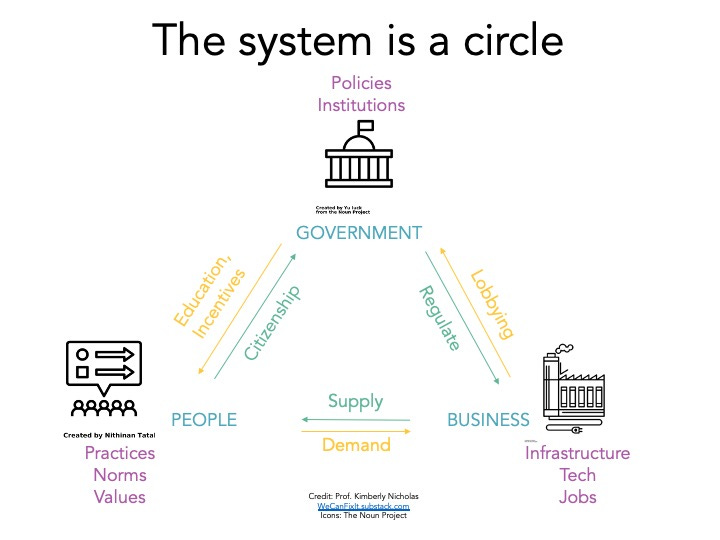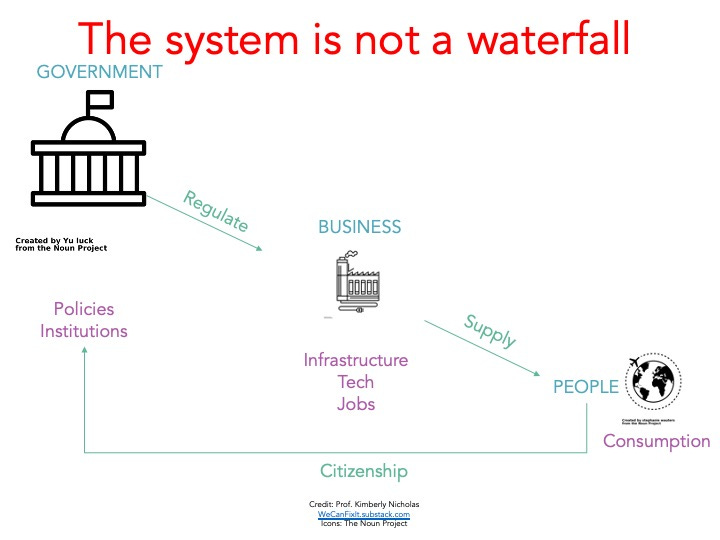System change is a circle, not a waterfall
Facts: System change is a circle, not a waterfall; Feelings: Climate-lonely? You're not alone; Action: Level up your climate media diet
It’s our one-year anniversary of facing the climate crisis with facts, feelings, and action at We Can Fix It! Thanks for being here— we need you now more than ever.
If you’re new, welcome! Subscribe to join Team Climate & get your monthly update:
Facts: System change is a circle, not a waterfall
When was the last time you heard one of these claims?
“It’s the top 100 oil companies responsible for over 70% of industrial climate pollution who have to fix climate change.”
“Climate change is a systemic problem; the only way to fix it is to fix the system.”
I want to unpack these ideas a bit.
As you know, dear reader, I am furious about the fossil fuel industry’s history of climate disinformation and delay; and critical of their greenwashing and attempts to avoid real, radical emissions reductions. I strongly support political and collective action (like here and here) to get governments to live up to their promises to stop catastrophic climate change, and am personally engaged in climate activism.
AND! To stop climate change, we have to make a fast, fair transition to a zero-carbon society and world. This will take social change at several levels, including:
political, to put policies and incentives in place so that everyone can meet their needs without causing climate change;
practical, to shut down polluting infrastructure and tech and replace it with climate-friendly ones; and
personal, which includes not only our individual behaviours, but also our cultural and social values and practices.
These “three spheres of transformation” are connected and help motivate and reinforce each other. Importantly, many of the key leverage points for a sustainability transformation are at the level of values (like justice, inclusion, reduced inequalities, and redefining the good life), and norms (social expectations) and practices (like reducing total consumption and waste). Transformation needs to include this deepest level of change, including beliefs, paradigms and mindsets. It doesn’t work to “only” change policy, because policy doesn’t get created in a vacuum.
What’s “the system” we’re trying to change?
I see the major actors in society as government, business, and people (sometimes called civil society or non-governmental organisations, NGOs). These actors are part of a system where they’re all connected to each other in a circle through relationships, which I’ve illustrated below. One cycle (shown in yellow) focuses on the power concentrated with business, which shapes government policy through lobbying. Governments shape people’s beliefs and behavior through education and incentives (like subsidies and taxes). People generate demand for products and services, which businesses meet.
Relationships also flow in the other direction (green arrows), where people are foundational in shaping government through their citizenship activities (e.g., voting, lobbying, social movements). Influenced by their citizens, governments set the boundaries (regulatory, legal, political) within which business must operate, and thereby steer what can be produced and supplied for people’s consumption.

Why is the system broken?
Right now we have a system locked in to pollution, which you can trace in the yellow cycle above:
… today’s high‐carbon system is not purely chance; actors with social, economic, and political power actively work to reinforce the status quo that favors them. Further, interactions between today’s high‐carbon infrastructure, policies, and lifestyles and culture tend to entrench further carbon lock‐in.
—me in UNDER THE SKY WE MAKE
The good folks at Climate Outreach picture the current system as a vicious cycle: people don’t prioritize climate action, so governments keep dragging their feet on climate policy, allowing companies to continue polluting business as usual, and upholding high-carbon behaviors, norms, and values.

How do we fix the system?
Fortunately, the politics of how to break this vicious circle are becoming clear. Steven Bernstein and Matthew Hoffmann argue it will take three political processes. First, cultural change, where new mindsets and practices shift expectations and norms; second, building capacity to decarbonize, through everything from education to institutional reforms; and third, using incentives and social movements to build coalitions that bring together and empower the many but diffuse interests who would benefit from decarbonization.
-me in UNDER THE SKY WE MAKE
Climate Outreach shows how citizens prioritising climate action leads to transformative climate policies, which hit businesses with both carrots and sticks to transform to zero carbon products and services, which are appreciated and adopted by consumers living low-carbon lifestyles, and fuel further support for climate action. Change at any point in this virtuous circle helps unlock change in other parts of the system, and moves the whole system towards transformation.
System change is not a waterfall
I want to contrast my circular view of the system we’re trying to change, outlined above, with the view that the system is determined by its structure. This linear view is more like a waterfall. It implies that top-down laws and regulations from governments are the only way to make meaningful change happen, via changing what businesses produce, which people passively consume.

The problem I have with the waterfall model is that it ignores the dynamics of the system, the power of relationships between actors, and diminishes people’s agency. It reduces the scope of “valid” climate action to only the political sphere.
We desperately need more, stronger, louder climate citizens! AND: we also need people to engage in high-impact climate actions throughout the lives they lead right now. Only a small fraction of the most concerned are politically engaged. Most people don’t think of political action when they think of climate action.
That’s why I consistently focus on high-impact climate actions across the key domains where your actions do make a difference, both for yourself and in pushing for wider system change: as a consumer, investor, at work, as a role model, and as a citizen. Please keep working in the ways you care about most, and support people working for positive change on any and every level. <3
Feelings: Lonely
I hear from a lot of readers who feel climate-lonely, like Bill, who wrote me from Florida. He doesn’t hear his local politicians, media, or friends talking about climate. Bill feels like he’s the only one thinking or worrying about climate, or taking action.
Feeling alone is tough; it can be demotivating, and sap your energy.
Good news: you’re really not alone!
Let’s look at Bill’s case, in Florida— a state that voted in 2020 for the previous president who was, ahem, not a climate champion.
In Jacksonville, Florida, 72% of Bill’s neighbours think (correctly!) that global warming is happening, 64% are worried about it, and 86% support funding renewable energy research.
If you’re in the US, have a look at the Yale maps— maybe you’re not as alone as it feels!

If you’re feeling climate-lonely, remember these tips on finding your climate peeps!
Action: Level Up Your Climate Media Diet
Media plays a critical role in shaping and informing public opinion and values —a key lever for system change!
Members of Parliament rated creating media attention as highly effective.
Media coverage directly increases public concern for climate change.
But climate media coverage is way too low:
Only half of Americans hear about global warming in the media once a month or more.
Major US media outlets were twice as likely to cover press releases opposing climate action as those favoring it, found Rachel Wetts of Brown University.
Your action this month: Follow and support excellent climate media and journalists.
Climate news
Climate justice and solutions: Grist
Clear explainers and data visualization: Carbon Brief
Scientists fact-checking climate news: Climate Feedback
Brilliant, haunting long-form features: Elizabeth Kolbert in The New Yorker
Newsletters
My biggest inspiration: The Crucial Years, by the visionary Bill McKibben
Holding polluters accountable: Heated, by Emily Atkin
Intersectional & fearless: HOT TAKE, by Mary Heglar & Amy Westervelt
Wonky policy deep dives: Volts, by David Roberts
Climate finance, CSR, and investing: The Zeroist, by Denise Young
P.S. Follow my Twitter lists of Climate inspiration and Green journalists.
Parting Thoughts
Recent events & articles
I want to say a HUGE thank you to the wonderful Beth Novak Milliken and Lindy Novak of Spottswoode Estate Vineyard & Winery, who generously shared copies of UNDER THE SKY WE MAKE with their top customers, & hosted a conversation on wine and climate action with me & Michael Silacci, Viticulturalist & Winemaker for Opus One. You can watch our conversation here.
Read
Hey, I read 100 books in 2021! It was such a pleasure to immerse myself in reading again. My tips to read more: (1) no phone in bed; (2) set limit of 30 min/day for social media; (3) track what you want to read on Goodreads and make good use of your library (don't forget e-books and audiobooks). Lmk what you’re reading!
P.S. I hope you and your loved ones have managed as well as possible during this tough phase of the pandemic. For extremely helpful, actionable, and timely pandemic advice, subscribe to Your Local Epidemiologist. To prepare to take care of yourself and others, read my advice in “What I Wish I Knew Before I Got Covid.” Take care friends!





Collapse Club is an online meeting place where members discuss their feelings about climate change and other aspects of collapse. Go to collapseclub.com for more information.